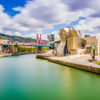7 Nights | IDYLLIC IBERIA
You will visit the following 3 places:

Bilbao
Bilbao is a municipality and city in Spain, a major city in the province of Biscay in the autonomous community of the Basque Country. It is the main urban area in what is defined as the Greater Basque region. Situated in the north-central part of Spain, its main urban core is surrounded by two small mountain ranges. After its foundation in the early 14th century by Diego López V de Haro, head of the powerful Haro family, the city was a commercial hub of the Basque Country that enjoyed significant importance in Green Spain. This was due to its port activity based on the export of iron extracted from the Biscayan quarries. Throughout the nineteenth century and the beginning of the twentieth, Bilbao experienced heavy industrialisation, making it the centre of the second-most industrialised region of Spain. Today, Bilbao is a vigorous service city that is experiencing an ongoing social, economic, and aesthetic revitalisation process, started by the iconic Bilbao Guggenheim Museum, and continued by infrastructure investments, such as the airport terminal, the rapid transit system, the tram line, the Alhóndiga, and the currently under development Abandoibarra and Zorrozaurre renewal projects. Bilbao is also home to football club Athletic Club de Bilbao, a significant symbol for Basque nationalism due to its promotion of Basque players and one of the most successful clubs in Spanish football history.

Porto
Porto (also known as Oporto in English), is the second largest city in Portugal after Lisbon and one of the major urban areas of the Iberian Peninsula. The urban area of Porto, which extends beyond the administrative limits of the city, has a population of 1.4 million (2011) in an area of 389 km2 (150 sq mi), making it the second-largest urban area in Portugal. Located along the Douro river estuary in Northern Portugal, Porto is one of the oldest European centres, and its historical core was proclaimed a World Heritage Site by UNESCO in 1996. The western part of its urban area extends to the coastline of the Atlantic Ocean. Its settlement dates back many centuries, when it was an outpost of the Roman Empire. One of Portugal's internationally famous exports, port wine, is named for Porto, since the metropolitan area, and in particular the caves of Vila Nova de Gaia, were responsible for the packaging, transport and export of the fortified wine. In 2014, Porto was elected The Best European Destination by the Best European Destinations Agency.










